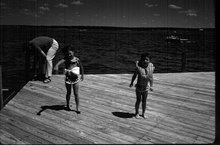
An arctic front assails Platt Rd today. I am awed by the farmer out cutting his hay in the freezing cold. The hawks are still mating and their screetching is audible through the thin glass when the wind is not howling. The sky is gray, and the fields yawn beneath the swollen bellies of low-flying jets.
What is is that so mesmerizes me about the lunar landscapes of the overburdens? Yesterday I stopped the car to take a few photos, knowing that I would have to be blessed with my grandfather's litigious patience or at least his flawless German equipment to capture anything as evocative as what catches my heart in my throat when I pass these awkward heaps of earth.
I think about what it would be like to live out here and document precisely, through the moments and days and years, the almost imperceptible alterations in soil and sky, animal and vegetable. Such thoughts bring me back to Annie Dillard, and I wonder if it is possible, any more, to craft a life out of fleeting perceptions of the natural world, and words.
"...the very root meaning of the word 'geography'" writes Trevor Barnes and James Duncan, "is literally 'earth writing' (from the Greek geo, meaning 'earth' and graphien, meaning, 'to write.'"
The conflicting urges of image and word--or action and contemplation--perplex me. Maybe this is what my grandfather felt, after all, that he belonged in a world of dry creek and sage, of twisted juniper branches and dark rooms filled with chemical smells where the eidetic imprints of his soul were wrought forth in emulsion and paper. When I leaf through his negatives I cannot know.
Would he have stopped here on this empty road to behold a heap of sand eroding as slowly as his life unraveled? Would he have found in this landscape or burdens the same ineffable beauty?



